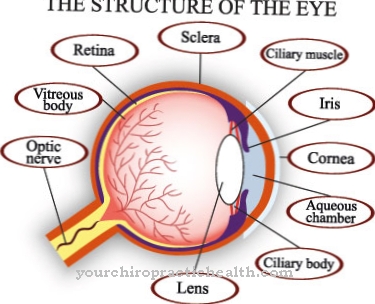Polyps are mostly benign Growths, Lumps or protrusions in the mucous membrane. Polyps can grow in different parts of the body, but they are most commonly found in the intestines, nose, and uterus. They range in size from a few millimeters to several centimeters and should be removed. Polyps (swelling) can degenerate over time and cause cancer.
What are polyps
.jpg)
© SciePro - stock.adobe.com
Polyps in the nose there are often enlarged tonsils and usually always benign. These nasal polyps can only be surgically removed in an operation if those affected are severely affected by the symptoms. Polyps in the intestine are mostly incidental findings that usually can be determined during preventive examinations.
Colon polyps are protrusions in the lining of the intestine (mucosa). As long as these tumors are benign, they are called adenomas. The polyps vary in shape, size, and number. They can sit broadly on the mucous membrane or have a polyp stalk. Adenomas usually grow max. 1 mm per year.
In the further course the benign adenoma can develop into a so-called carcinoma (malignant tumor). The proportion of intestinal polyps is over 90 percent and is one of the most common benign polyps (tumors).
causes
Polyps can have different causes. Proven reasons are infections by viruses or bacteria, diseases, eating habits and genetic defects.
It has been observed that nasal polyps often suffer from viral or bacterial infections. Asthmatics also have a higher incidence of polyps.
Diet plays a major role in intestinal polyps. A one-sided diet with a high proportion of animal fats and a low fiber content favor the development of polyps. Furthermore, studies have shown that smoking, alcohol and obesity are important factors in the development.
With certain hereditary diseases, such as Gardner's syndrome, familial adenomatous polyposis, Cowden's and Turcot's syndrome, there are more intestinal polyps. In connection with these diseases, the risk that benign polyps will develop into carcinoma (colon cancer) is greatly increased.
Symptoms, ailments & signs
Nasal polyps often go unnoticed for a long time. If they grow in size or clog your sinuses, it can cause breathing difficulties. Those affected then show noticeable mouth breathing and an increased susceptibility to infection. Continuous mouth breathing also dries out the oral mucosa, which can lead to bad breath and inflammation.
Those affected snore in their sleep and have a nasal voice. Since the polyps block the way to the olfactory cells, olfactory disorders can occur. If several polyps appear, the olfactory ability comes to a complete standstill. Those affected often suffer from migraine attacks and suffer from chronic fatigue.
In the long term, nasal polyps can lead to persistent sinus infections, which are manifested, among other things, by headaches and tenderness over the sinuses. In general, those affected often suffer from colds such as runny nose or inflammation of the bronchi and sinuses. If the nasal polyps are not treated, further complications can arise.
Adults are at risk of chronic oxygen deficiency in organs and the brain, which can result in neurological damage, among other things. In children, chronic polyps can cause deformities of the nose and eyes. This can lead to breathing difficulties, visual disturbances and emotional complaints.
Diagnosis & course
The Polyps depending on the subject. Polyps in the nose are usually diagnosed by an ENT doctor (ear, nose and throat). With the help of an otoscope and an endoscope, the nasal passages as well as the sinuses are examined. Radiological examinations such as computed tomography or magnetic resonance tomography are also carried out.
The polyps in the intestine are diagnosed by an internist. In the case of polyps in the lower part of the rectum, an initial diagnosis is made by means of tactile findings. If the rectal palpation examination gives a positive result, usually a colonoscopy (colonoscopy) done.
The colonoscopy ensures a deep insight into the large intestine down to the small intestine. Detected polyps can be removed during the examination using so-called gripping instruments and examined for malignancy (cancer).
The course of polyps is to be assessed differently. Since polyps are benign at first, they usually don't cause any symptoms. Nasal polyps are removed with a minor surgical procedure, but there is a risk that they will grow back or grow again elsewhere.
In the case of intestinal polyps, the earlier they are discovered and removed, the better the prognosis. Over time, the polyps grow and above a certain size can constrict the intestine, which can lead to an intestinal obstruction. Furthermore, the adenomas (benign polyps) can develop into carcinoma in the further course.
Complications
Polyps are usually harmless and do not cause any symptoms at first. However, as the tumors grow, they can trigger various complications. Nasal polyps can cause breathing problems and infections in the upper respiratory tract. This can lead to persistent infections such as bronchial asthma or chronic bronchitis.
In severe cases, the infection can spread to surrounding tissue and cause dangerous inflammation of the eye socket, meninges and brain. Depending on their size and number, intestinal polyps can impair bowel function. Sometimes constipation, diarrhea, and other digestive problems occur. When an intestinal polyp opens, it can cause bleeding, pain, and inflammation. In contrast, polyps of the inner lining of the uterus are mostly harmless.
Only in extremely rare cases can these become malignant and form a tumor. With polyps on the tonsils, there is a risk of sleep disorders, inflammation and an increased susceptibility to infections. This can be accompanied by pain, difficulty swallowing and other complications. The removal of polyps can cause sensitive injuries. In addition, wound healing disorders, pain, infections and visible scars and hernias can occur. Prescribed drugs can cause the usual side effects and interactions.
When should you go to the doctor?
If swellings, ulcers, or bulges form on the body, a doctor should be consulted. Medical help is required in the case of increasing growths, a feeling of tightness or disorders of the heart rhythm. If the symptoms persist, there are diseases that need to be diagnosed and treated. Although polyps are mostly benign, serious illnesses must be ruled out and an assessment of the general state of health is necessary. Restrictions in breathing are an alarming sign. If they stop or increase in intensity, a doctor is needed as soon as possible.
If you experience bad breath, headaches, sleep disorders, inner restlessness or a general feeling of illness, a doctor should be consulted. Irregularities to the touch, tenderness or sensory disturbances should be examined and treated. Polyps can form anywhere on the body. Therefore, a doctor is needed as soon as eating disorders or irregular locomotion occur.
Special attention is required if the functions are abnormal. A doctor should be presented with reduced vision, a loss of physical and mental performance and a reduced ability to smell. If there are disorders of balance, deformities of the skeletal system, swelling of the breast tissue or irregularities in digestion, a doctor should be consulted. Signs such as increased inflammation, increased body temperature, and snoring should be discussed with a doctor.
Treatment & Therapy
Treatment at Polyps in the nose involves the surgical removal of the tumor. In the case of very small tumors, these can also be treated with a nasal spray, but the success rate here is low. With the help of daily use of salt water nasal showers and cortisone sprays, one can prevent the recurrence of nasal polyps after long-term treatment.
Polyps in the intestine are also removed surgically, which is usually done during the colonoscopy. The therapy of first choice is the immediate removal of the polyps and a subsequent histological examination for malignancy.
If the polyps have already reached a size of several centimeters, endoscopic removal is no longer possible, so an operation under general anesthesia is necessary.
Treatment of polyps also includes extensive follow-up checks. Regular colonoscopies (colonoscopies) should be carried out, especially in the presence of hereditary diseases as well as an already diagnosed colon cancer (colon cancer).
prevention
There are currently no preventive measures against the development of Polyps. In the case of intestinal polyps (also applies to nasal polyps) you should - especially if there is a hereditary component - pay attention to a healthy diet, refrain from smoking and alcohol and try to avoid being overweight with sufficient exercise.
Another preventive measure is a so-called hemoccult test, which can be used to detect blood in the stool. suggests bleeding polyps in the intestines. An annual colonoscopy is used for the early detection of polyps. Although it cannot prevent the formation of polyps, it has been shown to reduce the risk of colon cancer.
A polyp can be a benign or malignant tumor that in many cases forms on the intestinal mucous membranes. Colloquially, enlarged tonsils are called polyps. This definition is not medically correct, since such growths can also develop on other organs.
Aftercare
The type of aftercare depends on whether the polyps are benign or malignant. Polyps generally require regular follow-up checks as they can develop into malignant ulcers. Even if they are small, have been classified as benign and do not cause any discomfort, the polyps should be monitored by a doctor. Colon carcinoma was often preceded by mutated polyps or they contributed to the development.
Follow-up care for polyps is important in order to detect any degeneration at an early stage. After the surgical removal of (malignant) polyps, a follow-up check at regular intervals is also indicated. If benign neoplasms of small size are discovered during a check-up, the specialist often removes them himself. If the newly grown polyps are noticeably large or malignant, an operation is scheduled.
The follow-up also checks whether the polyps are causing inflammation. In this case, the family doctor will prescribe anti-inflammatory drugs. Healing of the affected tissue is initiated as a follow-up measure.
You can do that yourself
To prevent polyps, diet should be optimized. Food that has an anti-inflammatory effect on the organism should be consumed more. Magnesium and lemon are natural active ingredients that have a positive effect on the body when it comes to inflammation. Fresh products such as broccoli, spinach, brown algae or onions and garlic should be regularly included in meals so that the patient can adequately support his body in the fight against polyps. At the same time, an unhealthy, fatty and high-calorie diet should be avoided. Likewise, the consumption of harmful substances such as nicotine, alcohol or drugs should be avoided.
Good sleep hygiene is helpful. The conditions for a restful night's sleep should be optimized so that the organism can regenerate sufficiently during rest periods. The body's own immune system is stabilized and can provide sufficient defenses when dealing with possible pathogens.
The disease is more common in people with an unhealthy lifestyle. Therefore, it is important to reduce stressors. The overall well-being should be promoted and medication should only be taken in consultation with the doctor. In the case of nasal polyps, regular steam inhalations can be carried out in everyday life to alleviate the symptoms. Deep breathing exercises are also helpful. Colon polyps are minimized in a natural way through a healthy lifestyle.

.jpg)
.jpg)


.jpg)


















.jpg)



